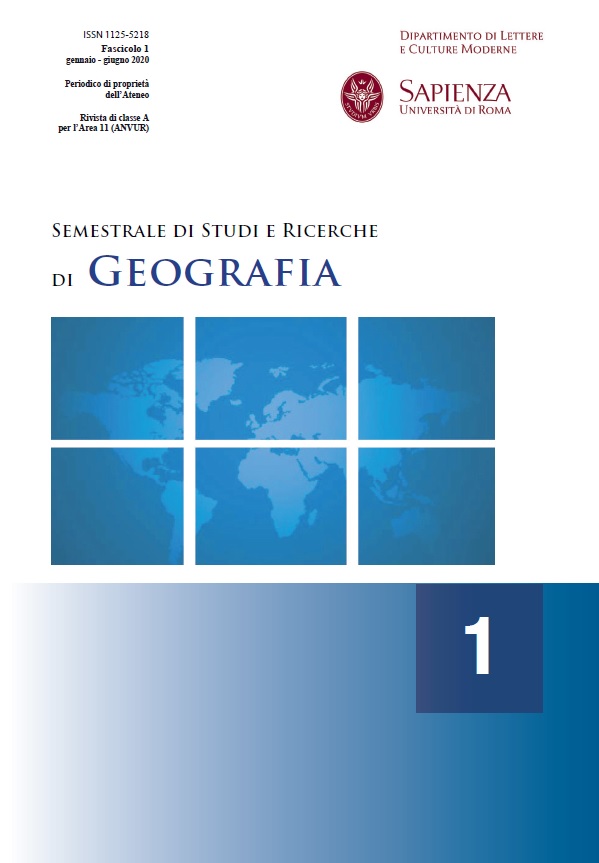Cartografia semantica e sensibile: spazi e progetti tra significati e sentimenti
DOI:
https://doi.org/10.13133/1125-5218.16775Abstract
Semantic and Sensitive Cartography: the Space between Listening and Storying
The last few decades have witnessed a significant change in the field of cartography. Cartography has gone «from doing to being»: new practice of making maps, different ways of recognize the territorial themes, various methods of represent both physical and immaterial elements have emerged. These changes can be related to the fast development of the ICT, the increased availability of digital data and a growing need to understand an ever-complex world. Also, these changes are certainly related to new techniques based on participatory approaches to spatial planning, spatial information and communications management. They have led the cartography to become a field of interest and action even for non-specialists, in particular the local communities and networks. Within the framework of the so-called «semantic cartography», useful to identify characteristics and tools for its implementation and practical application, the contribution focuses on a case study. The objective is to investigate, through a qualitative methodology, the cultural and artistic mapping practices and findings, in order to evaluate the innovativeness and replicability of the initiatives undertaken.
Cartographie sémantique et sensible : espaces et projets entre significations et sentiments
La manière de représenter les éléments et les thèmes territoriaux a fait passer la cartographie de la dimension du «faire» à celle de l’«être»: on a surgi nouvelles pratiques de création de cartes, différentes manières de reconnaître les thèmes territoriaux, différentes méthodes de représentation des éléments physiques et immatériels. Ces changements peuvent être liés au développement rapide des TIC, à la disponibilité accrue des données numériques et au besoin croissant de comprendre un monde toujours plus complexe. De plus, ces changements sont certainement liés à de nouvelles techniques basées sur des approches participatives de l’aménagement du territoire, de l’information spatiale et de la gestion des communications. Ils ont conduit la cartographie à devenir un champ d’intérêt et d’action même pour les non-spécialistes, en particulier les communautés. Dans le cadre de la «cartographie sémantique», utile pour identifier les caractéristiques et les mécanismes de son application pratique, la contribution se concentre sur une étude de cas. L’objectif est d’étudier, à travers une méthodologie qualitative, les pratiques et les résultats de la cartographie culturelle et artistique, afin d’évaluer le caractère innovant et la reproductibilité des initiatives entreprises.
##submission.downloads##
Pubblicato
Fascicolo
Sezione
Licenza
Gli autori che pubblicano su questa rivista accettano le seguenti condizioni:- Gli autori mantengono i diritti sulla loro opera e cedono alla rivista il diritto di prima pubblicazione dell'opera, contemporaneamente licenziata sotto una Licenza Creative Commons - Attribuzione che permette ad altri di condividere l'opera indicando la paternità intellettuale e la prima pubblicazione su questa rivista.
- Gli autori possono aderire ad altri accordi di licenza non esclusiva per la distribuzione della versione dell'opera pubblicata (es. depositarla in un archivio istituzionale o pubblicarla in una monografia), a patto di indicare che la prima pubblicazione è avvenuta su questa rivista.
- Gli autori possono diffondere la loro opera online (es. in repository istituzionali o nel loro sito web) prima e durante il processo di submission, poiché può portare a scambi produttivi e aumentare le citazioni dell'opera pubblicata (Vedi The Effect of Open Access).


